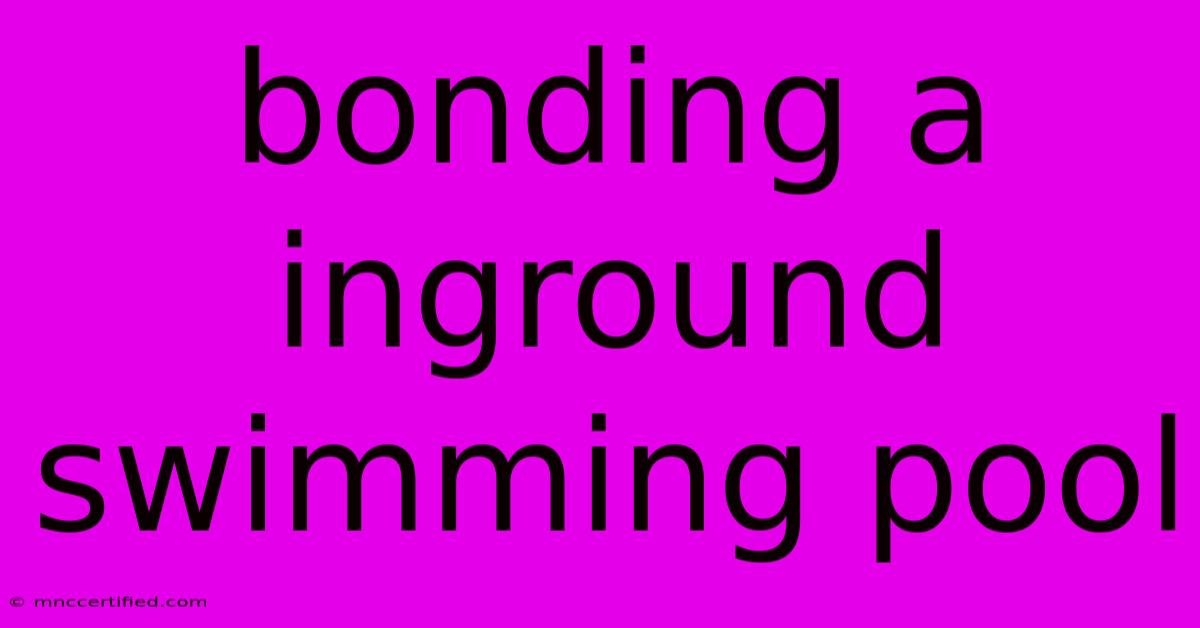Bonding A Inground Swimming Pool

Table of Contents
Bonding an Inground Swimming Pool: A Comprehensive Guide to Safety and Compliance
Choosing to install an inground pool is a significant investment, bringing years of enjoyment to your family. However, safety should always be the top priority. One crucial aspect of pool safety often overlooked is bonding. This article provides a comprehensive guide to understanding the importance of pool bonding, the process involved, and why it's essential for both safety and compliance.
What is Pool Bonding?
Pool bonding is the process of connecting all metal parts in and around your pool to create a single, unified electrical system. This system ensures that if a fault occurs, electricity is safely grounded, preventing the risk of electric shock. Think of it as a safety net for your electrical system. Metal components typically bonded include:
- Pool shell (if metal): Metal pool shells require bonding to prevent electrical shock hazards.
- Lighting fixtures: Underwater lights are a common source of potential electrical hazards.
- Filters and pumps: These contain metal components that need to be connected to the bonding system.
- Handrails and ladders: Metal ladders and railings are often included in the bonding system.
- Rebar: If rebar is used in the pool's construction, it must be part of the bonding system.
- Plumbing pipes (if metallic): Metal pipes near the pool should be bonded for extra safety.
Why is Pool Bonding Important?
Ignoring pool bonding is incredibly dangerous and could have fatal consequences. Without proper bonding, stray electrical currents from faulty equipment (like a malfunctioning pump or light) could flow through the water, posing a significant risk of electrocution to swimmers. Pool bonding is not just a suggestion; it's a crucial safety measure mandated by most building codes and insurance policies.
Key Benefits of Proper Pool Bonding:
- Reduces risk of electrocution: This is the primary and most vital benefit.
- Protects swimmers: Bonding ensures a safe swimming environment for everyone.
- Meets safety regulations: Compliance with local building codes is essential.
- Avoids costly insurance issues: Many insurance companies require proper bonding.
- Increases peace of mind: Knowing your pool is properly bonded provides significant reassurance.
The Pool Bonding Process: A Step-by-Step Guide
The bonding process should always be carried out by a qualified electrician experienced in pool installations. Attempting to bond your pool yourself without the proper knowledge and equipment is highly dangerous and strongly discouraged. The general process involves:
- Identifying all metal components: A thorough inspection is necessary to identify all metal parts needing bonding.
- Using appropriate bonding wire: Use copper bonding wire of the correct gauge (size) as specified by local codes and the manufacturer's instructions.
- Securely connecting the bonding wire: Use clamps or other approved connectors to create a secure and lasting connection between the metal components. Connections must be clean and corrosion-resistant.
- Grounding the system: The entire bonding system must be grounded to a suitable grounding electrode, often a ground rod driven into the earth.
- Inspection and testing: After the bonding process is complete, an electrician should test the system to ensure it's properly grounded and working correctly. This involves measuring the resistance to ground.
Maintaining Your Pool's Bonding System
Regular maintenance is key to ensuring your pool's bonding system remains effective. Check the bonding connections periodically for corrosion or damage. Any signs of deterioration should be addressed immediately by a qualified electrician.
Finding a Qualified Electrician
Choosing the right electrician is crucial for the safety and longevity of your pool's bonding system. Look for electricians with experience in pool installations and bonding, ensuring they are licensed and insured. Check online reviews and request references before making a decision.
Conclusion
Proper pool bonding is non-negotiable for ensuring the safety and compliance of your inground pool. Don't compromise on safety; invest in professional bonding installation and regular maintenance to protect your family and your investment. Remember, preventing accidents is far more cost-effective and valuable than dealing with the consequences.
Keywords: pool bonding, inground pool bonding, pool safety, electrical safety, bonding wire, grounding, pool installation, electrician, pool maintenance, safety regulations, building codes, electrocution, copper bonding wire, pool equipment, metal components, grounding electrode, pool compliance, insurance.

Thank you for visiting our website wich cover about Bonding A Inground Swimming Pool. We hope the information provided has been useful to you. Feel free to contact us if you have any questions or need further assistance. See you next time and dont miss to bookmark.
Featured Posts
-
Morris County Police Investigate Drone Use
Nov 20, 2024
-
Elon Musk Mocks Jaguars New Logo
Nov 20, 2024
-
August Giducos Plan D Investments
Nov 20, 2024
-
Bond Between Teacher And Student
Nov 20, 2024
-
Difference Between Bail And Bond
Nov 20, 2024